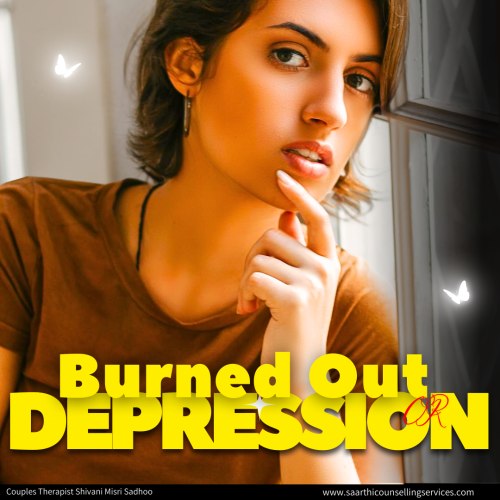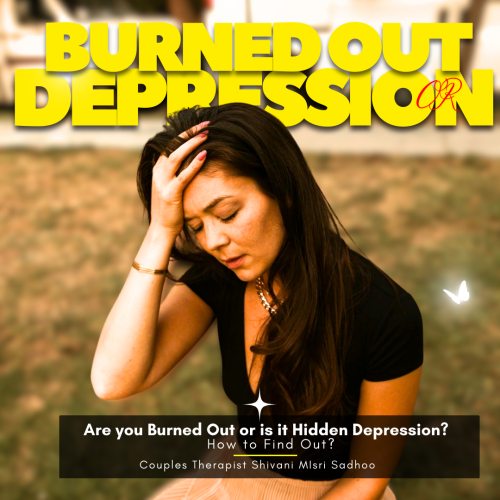Life today is hectic. Deadlines, responsibilities, and the constant pressure to “do more” leave many feeling drained and overwhelmed. In this fast-paced world, it is easy to overlook the signs of burnout or hidden depression, conditions that can seriously affect mental and emotional health if left unaddressed.
Shivani Misri Sadhoo, a leading couples therapist and psychologist in Delhi, explains how to recognise the differences between the two and why doing so is important for your well-being.

What is Burnout?
Burnout is a state of emotional, mental, and physical exhaustion that makes even simple tasks feel overwhelming. It often develops from prolonged exposure to stressors, particularly in work or caregiving roles, where demands are high, recognition is low, and control over responsibilities is limited.
Common signs of burnout include persistent fatigue, irritability, detachment from work or personal life, difficulty concentrating, and low motivation. People experiencing burnout may also notice physical symptoms such as headaches, digestive issues, or sleep disturbances.
Unlike temporary stress, burnout can make you feel emotionally numb, demotivated, and disconnected from tasks or people you once enjoyed. While it can affect anyone, early recognition and proper self-care can prevent it from escalating into more serious mental health conditions.
What is Depression?
Depression is a medical condition that affects both the mind and body. Unlike passing sadness, depression persists for weeks or months and can impact daily functioning. Symptoms include loss of interest in previously enjoyed activities, prolonged low energy, changes in sleep or appetite, difficulty concentrating, and feelings of hopelessness or guilt. Depression may arise from a combination of genetic, psychological, and environmental factors and sometimes requires professional intervention, such as therapy or medication.

Burnout vs. Depression
Although burnout and depression can feel similar, they are not the same.
- Cause: Burnout is usually triggered by external pressures like workload, caregiving, or a stressful environment. Depression may result from a complex mix of biological, psychological, and environmental factors, including chronic illness or major life events.
- Symptoms: Burnout primarily manifests as exhaustion, detachment, and reduced performance. Depression involves persistent sadness, loss of interest, physical complaints, and, in severe cases, thoughts of self-harm.
- Overlap: Experiencing burnout can increase the risk of depression, but not everyone with burnout develops depression. Understanding the differences is key to taking the right steps toward recovery.
How to Manage Burnout and Depression?
- Burnout: Incorporate rest and relaxation into your routine, take short breaks or vacations, exercise regularly, and talk to friends or family for emotional support. Setting boundaries and prioritising self-care can significantly improve energy levels and motivation.
- Depression: Seek professional help through therapy or counselling. Cognitive Behavioural Therapy (CBT) and other approaches can help manage negative thought patterns. In some cases, medication may be recommended by a healthcare provider. Maintaining healthy daily routines, including proper sleep, nutrition, and physical activity, can also support recovery.
Recognising whether you are experiencing burnout or depression is essential for maintaining mental and emotional health. While burnout can often improve with rest, self-care, and support, depression typically requires professional care and long-term attention. By being aware of the signs and seeking appropriate help, you can take proactive steps to protect your well-being and prevent long-term emotional challenges.

Shivani Misri Sadhoo is an internationally recommended relationship counsellor by the world’s biggest and most trusted study and research-based foundation for couples therapy – Gottman Institute. She is trained in specialised key relationship counselling Skills from AIIMS, VIMHANS and various other reputed institutions. Counsellor Shivani Misri Sadhoo is also certified in emotionally focused therapy, cognitive behavioural therapy, and dialectical behaviour therapy.
Counselor Shivani Misri Sadhoo is also a Certified Neuro Linguistic Practitioner with specialized training and experience in the field of affairs/betrayals, trust issues, difficulty communicating, conflicting values, bereavement, grief and loss (affairs, separation, divorce, childhood) and emotional health issue (anxiety, social anxiety, fear, depression, low mood).
Currently, Shivani Misri Sadhoo is one of the top counselors with the HIGHEST Success Rate with over 17,000 happy couples and individuals (based in India and abroad), who has benefited from her therapy. Psychologist and Counselor Shivani Misri Sadhoo not only practices independently from her clinic in Greater Kailash, Delhi, India, but also is listed on the panel of eminent hospitals like IBS Hospital Panel – Institute of Brain and Spine, Express Clinic, Fortis (formerly) based in Delhi.
Call Counselor: +91-8860875040
Email: saarthiforlife@gmail.com



